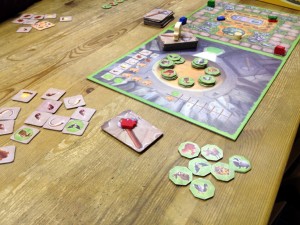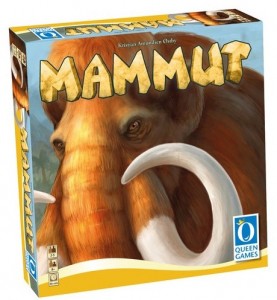Review: Mammut (Queen)
Posted by James (admin) on November 15th, 2011
 Not be confused with Krok Nik Douil’s game also called Mammut, this Mammut is a game by Queen Games. Players try to gather tiles which all score in different ways. This sounds very normal but the way the tiles are gathered is a very interesting mechanic delivering a funny and humorously evil game.
Not be confused with Krok Nik Douil’s game also called Mammut, this Mammut is a game by Queen Games. Players try to gather tiles which all score in different ways. This sounds very normal but the way the tiles are gathered is a very interesting mechanic delivering a funny and humorously evil game.
The game is played over several rounds – scoring occurs after each round and the player with the most victory points (VPs) wins. Each round 31 double-sided tiles are mixed up in a bag and then dumped onto the table and spread out. The tiles show fur, claws, axes, meat, fire and animals. Some tiles have question marks on them and these will only get turned over to reveal their actual value when scoring starts.
On your turn, you can either (a) take some (or all) of the tiles in the centre (if any remain), or (b) you can take all of another player’s tiles but you must put one of them back in the middle. Players take turns in clockwise order but you skip your turn if you have tiles in front of you. If you’re the only player without tiles and you take tiles from the middle, you must take all of the tiles and this ends the round.
Before you claim any tiles, you can play any of the action cards you have in your hand. Some are executed immediately allowing you to peek at the question mark tiles, turn some tiles over, or force players to put their tiles back in the middle. Other cards are scoring cards which are played face-down and only get revealed when scoring – some of these only give you their extra bonus if you have the most tusk tiles, fur tiles, etc. so placing them can be a gamble as you may not end up with the tiles you need to trigger it.
Once everyone has tiles, scoring is based on the 6 different tile types:
- Axes: Player takes one axe card per axe tile
- Fur: On-going total of fur tiles – Player with the most gets VPs and player with the fewest gets minus VPs
- Tusks: Worth 2 VP each
- Fire: Player with least fire tiles loses 5 VPs
- Meat: VPs based on relative amount of meat tiles – 1st scores 8 VPs, 2nd scores 5VPs, 3rd scores 2 VPs
- Animals: Player takes a matching animal tile – VPs at end of game based on number of different animals collected
 Overall, Mammut is a great game delivering constant player interaction, lots of funny moments and a surprisingly good-humouredly evil game.
Overall, Mammut is a great game delivering constant player interaction, lots of funny moments and a surprisingly good-humouredly evil game.
It works well for two reasons: the dividing of the tiles and the scoring system (which is why I explained the scoring in detail above). The dividing mechanic is like an active version of ‘you cut, I choose’ which has been included in good games like San Marco and A Piece of Cake but these games don’t have the back-and-forth. The back-and-forth aspect creates lots of cajoling by other players to take someone else’s tiles rather than theirs and fake indignation when you take a player’s tiles – it’s amazing how people get attached to their group of tiles.
Also, knowing another players may take your tiles means you need to balance (a) taking enough tiles so that you’ll score well, with (b) taking few enough tiles to make other groups appeal so no-one takes your group.
The other aspect that makes the game work is the scoring. I really admire how each of the scoring methods has a different structure: on-going total, proportional amount, relative amount, last place, group collection. The reason why this is important is that it makes the mix of tiles in a group very important and you usually want ‘just a few more’ tiles. Also, it makes comparing the different groups very interesting too which is key to the enjoyment of the game. As the game progresses, each player starts to view the tile groups in slightly different ways based on their current scoring cards, their on-going total of fur tiles, their position on the current collection of animals, etc. and I always like this in games.
The production is excellent (as with most Queen Games). Even the box inner is cool with one part showing outside a cave and the other inside a cave with the divider showing the cave entrance. As the tiles are double-sided the 31 tiles being split are unlikely to have the exact same mix.
Taking around 30-40 minutes, Mammut is an excellent light, fast, humorous and short game. Thoroughly enjoyable, especially if you like humourous screwage gameplay.
James.
[Played with 3 players]

